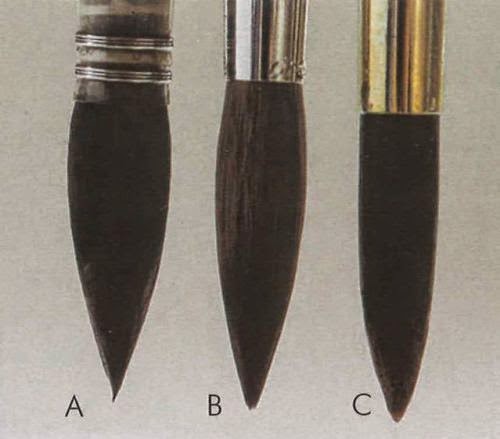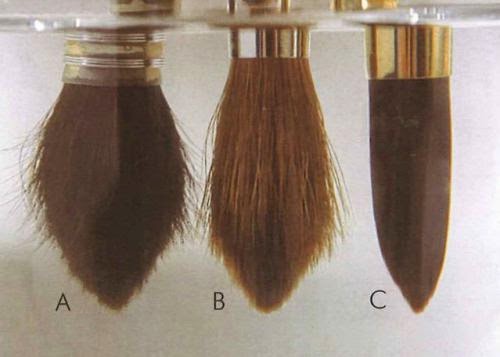The handle is typically made out of wood, but can also be made from plastic acrylic or other materials. Handles can be long or short depending on what you need from the brush. The Ferrule is what holds the bristles of the head in place, and the bristles make up the head and is the business end of the brush,
2. Brush ShapesThese are the most common brush shapes available.
But they are by no means the only types. Brushes come in many different shapes, thickness's, density's and heights of the bristles. Different brands will be different on all of these points, even though the basic shape of the head is similar. So when you buy a #4 round for example, it will may not be the EXACT same thickness or height as another brand because each will vary on when the tapering of the bristles starts, or how long the bristles are. Good things to keep in mind when shopping for brushes.
1. Brush Fibers
Knowing more about the nature of different brush fibers will help you choose which brushes to get for what type of paint. |
Natural Hair
Natural Hair also behaves differently when wet.

Dry to wet A) Squirrel mop 2) Sable 3) Synthetic fibre

As you can see the natural hair brushes open up a lot more then the synthetic, allowing them to pick up and hold more paint.
While these too could be considered 'Natural Hair' as they do come from animals, Hog Bristle is in a category all it's own for it's popularity, commonality, and over all different feel in comparison to other natural hair brushes. The hog bristle surface is flagged, or forked, at the tip which allows for strong, interlocking bristles that spring back and have a larger surface area. They will push and carry large amounts of heavy paint over coarse surfaces like canvas and wood panel for example. These are the preferred choice for heavier paints like oils.
Synthetic
Since natural hair brushes can be really expensive and also ware out after, many artists use synthetic as their fiber of choice. They are most commonly made from Nylon or Polyester materials. While they mostly lack a finer point and they hold less color, they are was more durable, much easier to clean, and way cheaper than natural hair brushes. Synthetic watercolor brushes are usually dyed with acidic chemicals during manufacturing that create tiny pits on the surface of each fiber. This mimics the scaly surface of animal fur, and it helps to maximize the synthetic brush's capacity for holding color. Stiffer synthetic fibers are also made for use in oil painting and acrylics.
It's also good to note that synthetic fiber brushes are the best for makeup, and face paint.
Comparison of all 3:







I am thankful to this blog giving unique and helpful knowledge about this topic, I read your blog now share great information here. This blog increse my knowledge source .Paint para mac
ReplyDelete